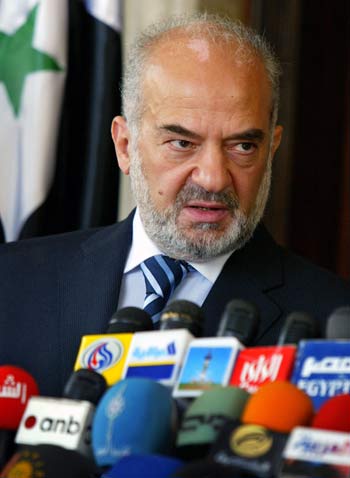
Iraq’s Prime Minister Ibrahim Jaafari (R)
CAIRO, Egypt (AP) – President Hosni Mubarak angered Iraqi leaders Sunday by saying Shiites there and across the Middle East are more loyal to Iran than to their own countries as he gave a startlingly frank warning about possible civil war in Iraq.
The flap highlights the escalating tensions between predominantly Sunni Arab countries – alarmed by possible Kurdish and Shiite domination of their neighbour – and Iraqis who say they are not getting enough support from their Arab brothers.
“Definitely Iran has influence on Shiites,” Mubarak said in an interview broadcast Saturday evening by Al-Arabiya television. “Shiites are 65 per cent of the Iraqis . . . Most of the Shiites are loyal to Iran, and not to the countries they are living in.”
He also said civil war “has almost started” in Iraq.
“At the moment, Iraq is almost close to destruction,” he warned.
Iraqi President Jalal Talabani, a Kurd, said Mubarak’s comments were not accurate.
“It is true that there are some kind of clashes among Sunnis and Shias. But it is not civil war,” he told Britain’s Channel 4 News.
British Foreign Secretary Jack Straw reiterated that civil war in Iraq was neither imminent nor inevitable but accepted that the situation was “very serious.”
Mubarak has rarely commented on the situation in Iraq and his statements usually are broad, vague expressions of concern over the violence and political turmoil there. Arab leaders also generally avoid pointed criticism of their fellow leaders.
So the interview startled not only Iraqis but also the Shiites who form large communities in a number of countries – particularly Saudi Arabia and Lebanon. Some of them said Mubarak’s comments only fuel momentum toward civil war.
Mubarak’s spokesman, Suleiman Awad, tried Sunday to soften the impact. He said the president was talking about Shiite sympathy with Iran “in view of its hosting of (Shiite) holy shrines.”
“The president’s statement about Iraq was only reflecting his increasing worries about the deteriorating situation and his keenness to maintain Iraq’s national unity,” Awad said in a statement carried by the state news agency MENA.
That did not seem to mollify Iraqi leaders.
“This is a stab in their (Shiites’) patriotism and their civilization,” Iraq’s three highest-ranking Kurdish, Shiite and Sunni Arab leaders – Talabani, Prime Minister Ibrahim al-Jaafari and Parliament Speaker Adnan Pachachi – said in a joint statement Sunday.
“Reality and historical facts show that the Shiites always have been patriotic and genuine Iraqis. This unfair accusation against Shiites is baseless,” Talabani, a Kurd, later told Iraqi television.

Iraqis hold a placard showing children beating a Saddam Statue during a demonstration organized to mark the third anniversary of the toppling of Saddam Hussein’s regime (EPA)

Iraqi President Jalal Talabani with Prime Minister Ibrahim Jaafari and Acting Parliament Speaker Adnan al-Pachachi in Baghdad (R)
